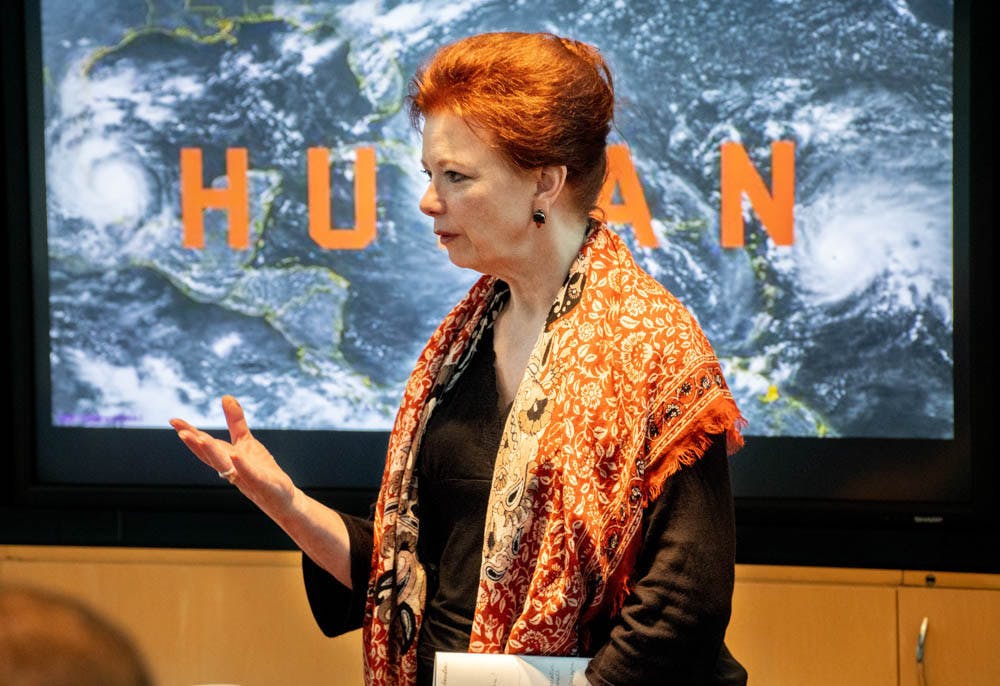While a torrential downpour drenched Providence yesterday afternoon, Angela Blanchard, president emerita of BakerRipley — a nonprofit that provides community programs in Houston and along the Texas Gulf Coast — held a teach-in at the Watson Institute for International and Public Affairs to discuss how communities respond to hurricanes and why residents remain in areas often threatened by the dangerous storms.
Throughout her professional career, Blanchard, who served as a Social Entrepreneur in Residence at the Swearer Center for Public Service last spring, has helped coordinate relief and aid efforts during major disasters including Hurricanes Katrina, Harvey and Rita, she said.
To start the teach-in, Blanchard played the music video for Zachary Richard’s “Laisse Le Vent Souffler,” which features Richard dancing and singing in strong rain and wind. The video reminded Isabela Karibjanian ’19 of the hurricane parties that would often occur in South Florida where she grew up. “A storm is announced and you know everything’s going to shut down, and a lot of people choose to cope with that by throwing a party the night before the hurricane hits,” Karibjanian said.
Later, Blanchard spoke about the challenges of responding to a devastating hurricane by pointing out weaknesses in the United States’ current emergency response system and the inaccessibility of affected areas following the storm. “The (Federal Emergency Management Agency) response system we use has not substantially evolved — it’s the same system we had before Katrina,” she said.
When FEMA became part of the Department of Homeland Security in 2003, Blanchard said that the U.S. government “buried it … beneath about 11 layers of bureaucracy.”
“Since that time, we’ve seen a really drastically different and far more ineffectual response to disasters,” she added.
Even if the United States possessed a robust federal emergency response system, “these slow-moving hurricanes that (pick up) all the warm waters of the oceans … pass over, sit on top of cities and drop that water on them,” would prevent emergency responders from entering the flooded regions, Blanchard said.
Blanchard then shared with the attendees several “leadership lessons” to coordinate effective disaster responses. In her first lesson, Blanchard said that individuals responding to a disaster like a hurricane should understand that no one “bigger, better, stronger (or) faster is coming” to the rescue, making it necessary to take initiative to help others.
“What you see is your job,” she added.
Providing relief following a hurricane often required responders to improvise and “to know which rules to break,” Blanchard said.
In a shelter that BakerRipley set up at Houston’s NRG Center for individuals displaced by Hurricane Harvey, “we broke ... almost all of (the rules),” Blanchard said.
When caring for individuals affected by a hurricane, Blanchard said it was critically important for shelter providers to create “some dignified way for people to be in a shelter.” Following Hurricane Harvey, BakerRipley worked toward that goal in part by referring to “people only as guests or neighbors” and by making announcements in 16 different languages, she added.
Throughout the teach-in, Blanchard stressed the importance of cultivating empathy when preparing for and responding to natural disasters.
“As I was working with some students … who were thinking through policies that we should have in cities for both how we dictate to people what they should do and then what we do once they’re displaced, I wanted the starting place always to be empathy,” Blanchard said. She added that it is important “to actually (be) able to put ourselves in the place of the individual who has to make these decisions with an incomplete and changing set of facts.”
Manny Gorotiza ’19.5 said the teach-in left him feeling “somewhat hopeful,” referencing an image Blanchard shared of the number of volunteers who showed up to help following Hurricane Harvey.
“There are good people around. That’s a good thing to think about,” Gorotiza said.





